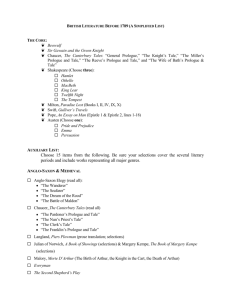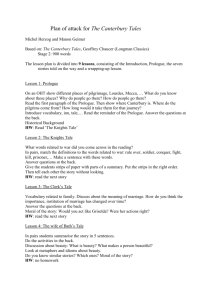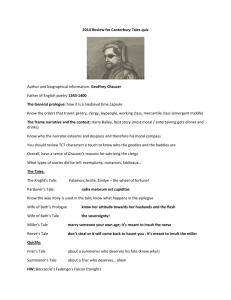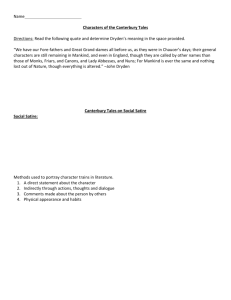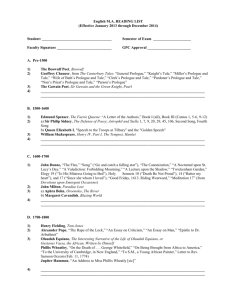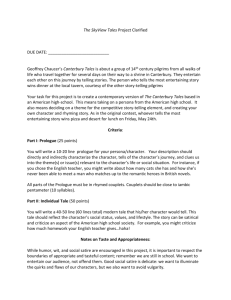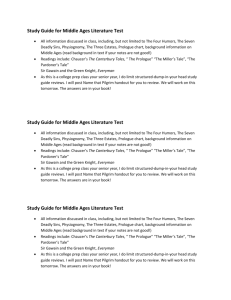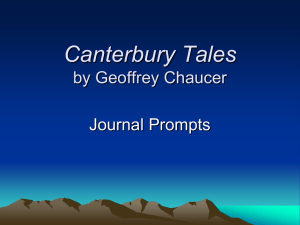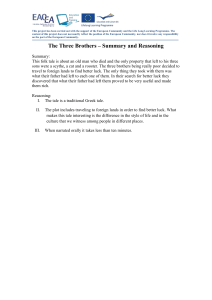Reading List - Pittsburg State University
advertisement
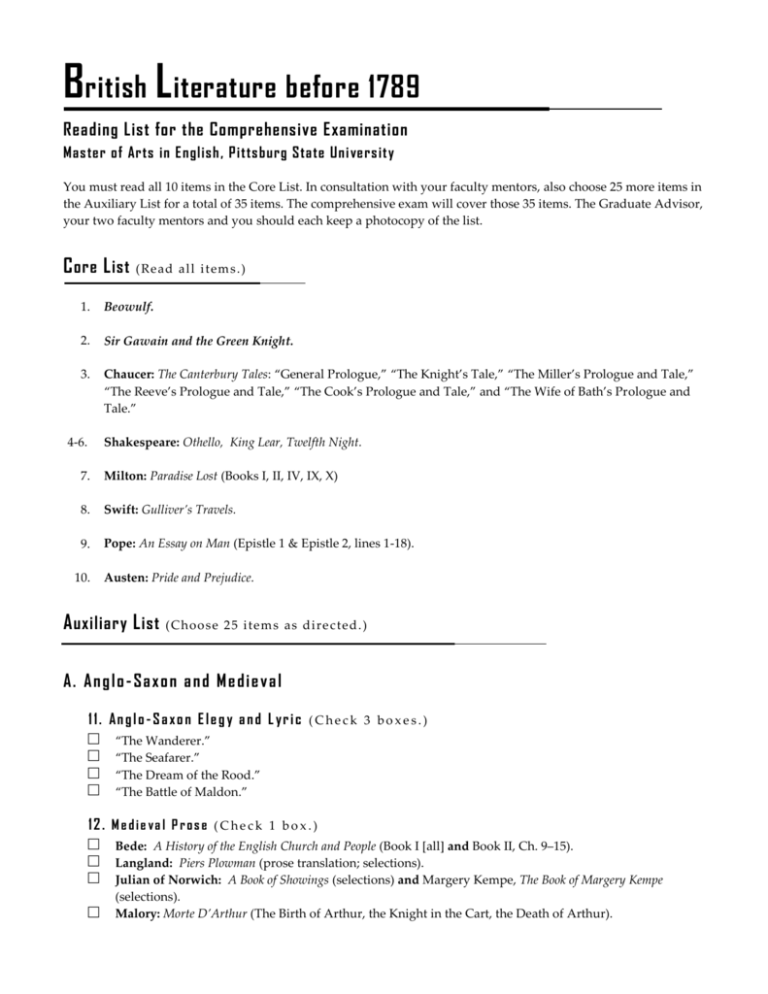
British Literature before 1789 Reading List for the Comprehensive Examination Mas ter of Arts in English , Pitts burg State Uni vers ity You must read all 10 items in the Core List. In consultation with your faculty mentors, also choose 25 more items in the Auxiliary List for a total of 35 items. The comprehensive exam will cover those 35 items. The Graduate Advisor, your two faculty mentors and you should each keep a photocopy of the list. C ore L ist (Re ad al l i t em s.) 1. Beowulf. 2. Sir Gawain and the Green Knight. 3. Chaucer: The Canterbury Tales: “General Prologue,” “The Knight’s Tale,” “The Miller’s Prologue and Tale,” “The Reeve’s Prologue and Tale,” “The Cook’s Prologue and Tale,” and “The Wife of Bath’s Prologue and Tale.” 4-6. Shakespeare: Othello, King Lear, Twelfth Night. 7. Milton: Paradise Lost (Books I, II, IV, IX, X) 8. Swift: Gulliver’s Travels. 9. Pope: An Essay on Man (Epistle 1 & Epistle 2, lines 1-18). 10. Austen: Pride and Prejudice. A uxiliary L ist ( Cho o s e 2 5 i te m s as di re c ted . ) A. An g l o - Sa xo n a n d M e d i e va l 11. An g l o - S a x o n E l e g y a n d L yr i c ( C h e c k 3 b o x e s . ) 12. M e d i e va l P r o s e ( C h e c k 1 b o x . ) “The Wanderer.” “The Seafarer.” “The Dream of the Rood.” “The Battle of Maldon.” Bede: A History of the English Church and People (Book I [all] and Book II, Ch. 9–15). Langland: Piers Plowman (prose translation; selections). Julian of Norwich: A Book of Showings (selections) and Margery Kempe, The Book of Margery Kempe (selections). Malory: Morte D’Arthur (The Birth of Arthur, the Knight in the Cart, the Death of Arthur). 1 3 , M e d i e va l P o e t r y ( C h e c k 1 b o x . ) Chaucer (If you choose this selection, read three of the following): __ “The Pardoner’s Prologue and Tale.” __ “The Nun’s Priest’s Tale.” __ “The Clerk’s Tale.” __ “The Franklin’s Prologue and Tale.” __ “The Merchant’s Prologue and Tale.” Chaucer (If you choose this selection, read one of the following): __ The Book of the Duchess. __ The Parliament of Fowls. __ The Legend of Good Women. Gower: Confessio Amantis, Book VIII, “Apollonius of Tyre.” Pearl. Ballads: “Judas,” “Lord Randall,” “The Three Ravens,” “Sir Patrick Spens,” “Bonny Barbara Allan,” “Robin Hood and the Curtal Friar,” “The Wife of Usher’s Well,” “The Bonny Earl of Murray.” Skelton (If you choose this selection, read one of the following): __ Elynour Rummynge. __ Speke Parott. __ Collyn Clout. 1 4 / 1 5 . M e d i e va l D r a m a ( C h e c k 2 b o x e s . ) The Sacrifice of Isaac. The Castle of Perseverance. Everyman. The Second Shepherd’s Play. Heywood: The Play of the Weather or A Mery Play … B. R e na is s a nc e ( 16 t h a n d Ea r l y 17 t h Ce n t u r y) 16. S o n n e t s a n d O t h e r L yr i c s ( C h e c k 1 b o x . ) Sidney: Astrophil and Stella. Spenser: Amoretti & Epithalamion. Shakespeare: Sonnets. Mary Wroth: Pamphilia to Amphilanthus. Renaissance Lyrics: Wyatt, “Whoso List to Hunt,” “My Galley,” “They Flee From Me,” “My Lute, Awake!,” “Blame Not My Lute”; Surrey, “Love that Doth Reign,” “Th’ Assyrians’ King,” “Set Me Whereas the Sun Doth Parch the Green,” “The Soote Season,” “Wyatt Resteth Here”; Elizabeth I, “The Doubt of Future Foes,” “On Monsieur’s Departure”; A. Lanyer, “The Description of Cookham”; Raleigh, “Nature, that Washed Her Hands in Milk,” “To His Son,” “The Lie,” “The Nymph’s Reply to the Shepherd”; Marlowe, “The Passionate Shepherd to His Love.” 17/18. Drama: Shakespeare (Check 2 boxes.) Henry IV (Part I). Henry IV (Part II). Henry V. Measure for Measure. The Tempest. Hamlet. 2 MacBeth. 19 /2 0. Drama: Marlowe , Jons on, and Others (Check 2 boxes.) Marlowe: The Tragical History of Doctor Faustus or Edward II. Jonson: The Alchemist or Volpone. Dekker: The Shoemakers’ Holiday. Middleton and Rowley: The Changeling. Webster: The Duchess of Malfi. “Tourneur”: The Revenger’s Tragedy. Ford: ’Tis Pity She’s a Whore or The Broken Heart. 2 1/22. Pros e and Critic is m (Check 2 bo xes.) More: Utopia. Elizabeth I: “On Mary, Queen of Scots,” “On Mary’s Execution,” “To the English Troops at Tilbury,” “The Golden Speech,” and Hobbes: Leviathan (selections). Sidney: An Apology for Poetry. Bacon: Ten essays from Counsels, Civil and Mora.l King James Bible: Books of Genesis, Exodus, Job, and Matthew. Browne: Religio Medici (selections) or “Urn-Burial.” Bacon: selections on poetry from The New Organon and Of the Dignity and Advancement of Learning. Burton: from The Anatomy of Melancholy, “Democritus Junior to the Reader.” Jonson: Timber or Discoveries (selections) and “Conversations with Will Drummond.” Hobbes: Answer to Davenant’s Preface to Gondibert. C. Se ve n te e nt h Ce nt u r y 2 3/2 4. Drama (Check 2 boxes.) Buckingham: The Rehearsal (1671). Etherege: The Man of Mode (1676). Wycherley: The Country Wife (1676). Behn: The Rover (1677). Dryden: All for Love (1677). Otway: Venice Preserv’d (1682). Pix: The Spanish Wives (1696). Congreve: The Way of the World (1700). 2 5 . L yr i c s ( C h e c k 2 b o x e s i n e a c h o f t h e 3 g r o u p s . ) Group 1: Johnson and the Cavalier Poets (Check 2 boxes.) Jonson, “On My First Daughter,” “On My First Son,” “Inviting a Friend to Supper,” “To Penshurst,” “Still to Be Neat,” “Ode to Himself.” Herrick, “Delight in Disorder,” “Corinna’s Going A-Maying,” “To the Virgins,” “The Hock-Cart,” “Upon Julia’s Clothes,” “His Farewell to Sack,” “The Welcome to Sack.” Lovelace, “To Lucasta, Going Beyond the Seas,” To Lucasta, Going to the Wars,” “To Althea, from Prison.” Carew, “To A.L., Persuasions to Love,” “Murdering Beauty,” “To My Mistriss, I Burning in Love,” “To Her Again, She Burning in a Fever,” “A Pastoral Dialogue.” Group 2: Donne and the “Metaphysical” School (Check 2 boxes.) Donne, “The Flea,” “The Good-Morrow,” “Go and Catch a Falling Star,” “The Canonization,” “A Valediction: Forbidding Mourning,” “The Ecstasy,” Holy Sonnets # 1, 5, 10, 14, & 18, “Good Friday, 1613. Riding Westward.” 3 Herbert, “The Altar,” “Easter Wings,” “Redemption,” “The Windows,” “Man,” “The Collar,” “The Pulley,” “Heaven,” “Love (III).” Vaughan, “To Amoret,” “Regeneration,” “Distraction,” “The Pursuit,” “The Retreat,” “The World,” “They Are All Gone into the World of Light.” King, “An Exequy,” “Sic Vita,” “A Contemplation upon Flowers.” Traherne, “A Serious and a Curious Night-Meditation.” Group 3: Restoration Lyrics (Check 2 boxes.) K. Philips, “A Married State,” “On the Death of My First and Dearest Child,” “To Mrs. Mary Awbrey at Parting,” “To My Excellent Lucasia,” “The World.” Marvell, “Bermudas,” “To His Coy Mistress,” “The Mower Against Gardens,” “Damon the Mower,” “The Mower to the Glowworms,” “The Mower’s Song,” “The Garden.” Rochester, “The Disabled Debauchee,” “The Imperfect Enjoyment,” “Song: Love a Woman, You’re an Ass,” “A Satire Against Mankind,” “Upon Nothing.” Behn, “The Disappointment,” “To the Fair Clarinda,” “On the Death of the Late Earl of Rochester,” “To Mrs W. on Her Excellent Verses,” “A Letter to a Brother of the Pen in Tribulation,” “To Mr. Creech on His Excellent Translation of Lucretius.” 2 6/2 7. E l e g y a n d N a r r a t i ve ( C h e c k 2 b o x e s . ) Milton: “L’ Allegro,” “Il Penseroso,” “Lycidas.” K. Philips: “Upon the Double Murder of King Charles”; Butler, Hudibras (Canto 1). Dryden: “Absalom and Achitophel” and “The Medall.” Cavendish: “The Hunting of the Hare”; Rochester “An Allusion to Horace”; Dryden, “MacFlecknoe.” 28. Prose and Criticism (Check 1 box.) Milton: Areopagitica. Pepys: Diary (selections). Bunyan: The Pilgrim’s Progress (Part 1). Dryden: Of Dramatic Poesy, an Essay. Locke: Essay Concerning Human Understanding (Book III, Chapters 1, 2, 9, 10, 11). D. E i g h t e e n t h Ce n t u r y 29. Poetry (Check 1 box.) Pope: The Rape of the Lock; Swift: “A Description of the Morning,” “A Description of a City Shower,” 30/31. “The Lady’s Dressing”; Montagu: “The Reasons that Induced Dr. S. to Write a Poem Called The Lady’s Dressing-Room.” Johnson: The Vanity of Human Wishes; Young: selections from The Complaint, or, Night Thoughts on Life, Death, and Immortality; Gray: “Ode on a Prospect of Eton College,” “Elegy Written in a Country Churchyard”; Cowper: “The Cast-away.” Pope: Windsor-Forest; Finch: “Nocturne,” “The Petition for an Absolute Retreat”; Thomson: The Seasons (“Spring” or “Summer” or “Autumn” or Winter”); Cowper: The Task (from Book IV: The Winter Evening). Drama (Check 2 boxes.) Farquhar: The Beaux’ Strategem (1707). Addison: Cato (1713). Centlivre: A Bold Stroke for a Wife (1718). Steele: The Conscious Lovers (1722). Gay: The Beggar’s Opera (1728). 4 32 /33. 34/35. Fielding: Tragedy of Tragedies; or, Tom Thumb the Great (1730). Goldsmith: She Stoops to Conquer (1773). Sheridan: The School for Scandal (1777) or The Critic (1779). Burney: The Witlings (1779). N o ve l ( C h e c k 2 b o x e s . ) Behn: Oroonoko and Defoe: Robinson Crusoe. Defoe: Moll Flanders. Richardson: Pamela. Fielding: Joseph Andrews or Tom Jones. Smollett: Humphrey Clinker. Stern: Tristram Shandy. Burney: Evelina. Austen: Emma or Persuasion. Prose and Criticism (Check 2 boxes.) Addison and Steele: Selections from The Tatler and The Spectator. Pope: An Essay on Criticism. Swift: “A Modest Proposal” or A Tale of a Tub (selections). Montagu: Turkish Embassy Letters. Johnson: Rasselas. Johnson: Lives of the Poets: “Life of Dryden” or “Life of Pope.” Johnson: “Preface to Shakespeare,” selected introductions to Shakespeare’s plays, and “Preface to A Dictionary of the English Language.” Boswell: Life of Johnson (100 contiguous pages). 5
